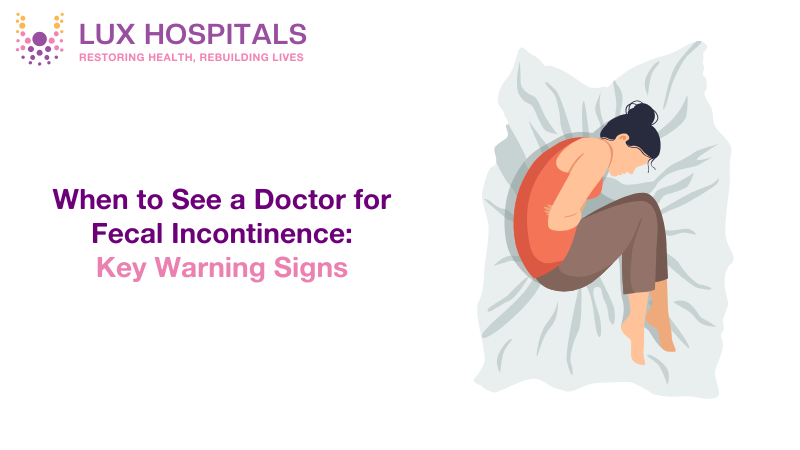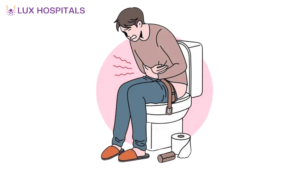When to See a Doctor for Fecal Incontinence: Key Warning Signs

Fecal incontinence, also known as bowel incontinence, is the inability to control bowel movements, leading to unexpected leakage of stool. While it can be embarrassing and uncomfortable to discuss, fecal incontinence is a common issue that affects people of all ages, especially older adults. Occasional loss of bowel control may not be a major concern, but persistent or worsening symptoms could indicate an underlying health condition that requires medical attention.
In this blog, we’ll explore the key warning signs of fecal incontinence and when you should seek medical advice to prevent further complications and improve your quality of life.
Understanding Fecal Incontinence
Fecal incontinence occurs when the muscles and nerves that control bowel movements are damaged or weakened. It can result in mild leakage when passing gas or complete loss of bowel control. The condition can be caused by various factors, including:
- Muscle or nerve damage (often from childbirth, surgery, or injury)
- Chronic constipation or diarrhea
- Hemorrhoids or rectal prolapse
- Neurological disorders (such as multiple sclerosis or stroke)
- Inflammatory bowel disease (IBD)
While some cases of fecal incontinence may improve with lifestyle changes and medications, more severe cases may require medical intervention. Recognizing the signs of fecal incontinence early can help prevent complications and improve treatment outcomes.
Key Warning Signs of Fecal Incontinence to See a Doctor
If you experience any of the following signs of fecal incontinence, it’s important to consult a healthcare professional for proper evaluation and treatment.
1. Frequent or Sudden Loss of Bowel Control
If you find yourself regularly unable to control bowel movements, it may indicate underlying muscle weakness or nerve dysfunction. Sudden and unexpected leakage, even with mild pressure like coughing or sneezing, is a sign that the muscles or nerves involved in bowel control may be compromised.
2. Pain or Discomfort During Bowel Movements
Experiencing pain or cramping when passing stool can suggest issues such as anal fissures, hemorrhoids, or rectal inflammation. Chronic pain associated with bowel movements should not be ignored, as it may point to underlying gastrointestinal problems that need medical attention.
3. Blood in Stool or Rectal Bleeding
The presence of blood in the stool or on toilet paper after wiping could be a sign of hemorrhoids, anal fissures, or more serious conditions like colorectal cancer. Bright red blood often indicates bleeding near the anus, while dark or tarry stools may suggest bleeding higher in the digestive tract.
4. Chronic Constipation or Diarrhea
Long-term constipation can weaken the rectal muscles and stretch the anus, making it difficult to retain stool. On the other hand, chronic diarrhea can reduce bowel control due to increased bowel sensitivity and inflammation. If either condition persists for more than a few weeks, it’s time to seek medical help.
5. Unexplained Weight Loss
Sudden, unexplained weight loss accompanied by fecal incontinence could be a sign of malabsorption issues, inflammatory bowel disease (IBD), or even cancer. If you experience weight loss without changes to your diet or exercise habits, consult a doctor immediately.
6. Loss of Sensation or Numbness Around the Rectal Area
If you lose the ability to feel the urge to pass stool or experience numbness in the rectal area, it may suggest nerve damage. This is common in people with spinal cord injuries or neurological conditions and requires prompt medical evaluation.
7. Changes in Bowel Habits
Sudden changes in stool consistency, color, or frequency may signal digestive issues such as irritable bowel syndrome (IBS), infections, or more serious gastrointestinal disorders. If your bowel habits have changed significantly and persist for more than two weeks, it’s time to consult a doctor.
Why Early Diagnosis Matters
Ignoring the signs of fecal incontinence can lead to complications, including:
- Skin irritation or infections around the anus
- Emotional distress and social isolation
- Worsening of underlying gastrointestinal or neurological conditions
Early diagnosis allows healthcare providers to identify the root cause of fecal incontinence and recommend appropriate treatments, such as:
- Pelvic floor exercises to strengthen rectal muscles
- Dietary adjustments to regulate bowel movements
- Medications to control diarrhea or constipation
- Biofeedback therapy to improve muscle coordination
- Surgical interventions (in severe cases)
When to Seek Emergency Care
In some cases, signs of fecal incontinence may indicate a more serious condition that requires immediate medical attention. Seek emergency care if you experience:
- Severe abdominal pain
- High fever
- Bloody or black stools
- Sudden loss of bowel control with weakness in the legs or difficulty walking
Conclusion
Fecal incontinence can be a difficult and embarrassing issue, but it’s important to remember that you’re not alone. Consulting a healthcare provider at the first signs of fecal incontinence can help you regain control and improve your quality of life. With proper diagnosis and treatment, many people experience significant relief from symptoms and improved bowel function.
If you’re experiencing any of the signs of fecal incontinence mentioned above, don’t hesitate to reach out to a healthcare professional. Early intervention can make a significant difference in managing and treating fecal incontinence effectively.
Frequently Asked Questions
Fecal incontinence can be treated with pelvic floor exercises, dietary changes, medications, biofeedback therapy, and surgery in severe cases.
Fecal incontinence can be caused by muscle or nerve damage, chronic constipation, diarrhea, hemorrhoids, rectal prolapse, and neurological disorders.
Occasional fecal incontinence may not be serious, but persistent or worsening symptoms can indicate underlying health issues like muscle or nerve damage, gastrointestinal disorders, or even colorectal cancer.
Yes, fecal incontinence is more common in older adults due to muscle weakness, nerve damage, and other age-related changes in bowel function. However, it is not a normal part of aging and can often be treated.
Yes, stress and anxiety can affect digestion and bowel function, leading to diarrhea or constipation, which can worsen fecal incontinence. Stress management techniques like meditation and deep breathing can help.
Yes, surgery may be an option in severe cases. Procedures like sphincter repair, sacral nerve stimulation, or colostomy may be recommended if other treatments are not effective.





















